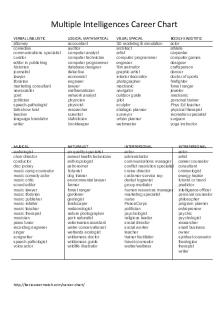SPED 226 Multiple Intelligences PDF

| Title | SPED 226 Multiple Intelligences |
|---|---|
| Author | Taylor Schrock |
| Course | Except Lrn Reg Clssrm |
| Institution | Indiana State University |
| Pages | 2 |
| File Size | 116.8 KB |
| File Type | |
| Total Downloads | 75 |
| Total Views | 179 |
Summary
homework assignment multiple intelligences ...
Description
SPED 226 Extra Credit Assignment Multiple Intelligences The theory of multiple intelligences was developed in 1983 by Dr. Howard Gardner, professor of education at Harvard University. These intelligences are: 1. Define/explain the theory "multiple intelligences." “There is no general intelligence but rather multiple, distinct intelligences.” People have a unique blend of capabilities and skills (intelligences). Helps explain the variety of individual differences in different types of mental performance. 2. List examples of each modality (strengths in learning of each modality). Linguistic Intelligence (word smart)- sensitivity to the meaning of words, the order among words, the sound, rhythms, inflections, and meter of words. Involved in reading, writing, listening and talking. Logical-Mathematical Intelligence (number/reasoning smart)- the capacity to conceptualize the logical relations among actions or symbols. Piaget believed he was studying the range of intelligences, but he was actually studying logical mathematical intelligence. Solving logical puzzles, deriving proofs, and performing calculations. Spatial Intelligence (picture smart)- the ability to conceptualize and manipulate large-scale spatial arrays, or more local forms of space. Moving from one location to another or determine one’s orientation in space. Bodily-Kinesthetic Intelligence (body smart)- the ability to uses one’s whole body, or parts of the body, to solve problems or create products. Involved in using one’s body or body parts to perform skillful and purposeful movements (dancers, athletes, and surgeons). Musical Intelligence (music smart)- sensitivity to rhythm, pitch, meter, tone, melody, and timbre. May entail the ability to sing, play musical instruments, and/or compose music. Involved in playing, composing, singing and conducting. Make diagnoses on the careful listening to patterns of sounds. Interpersonal Intelligence (people smart)-the ability to interact with others, sensitivity to other’s moods, feelings, temperaments and motivations. Involved in understanding oneself and having insight into one’s thoughts, actions and emotions (self-understanding). Intrapersonal Intelligence (self-smart)- sensitivity to one’s own feelings, goals, and anxieties, and the capacity to plan and act in light of one’s own traits, not particular to certain careers. Rather it is goal for every individual in a complex modern society, where one had to make consequential decisions for oneself. Involved in understanding of others and one’s relations to others. Being in high social skills (psychologists, teachers and politicians are supposed to be high in this type of intelligence).
Naturalist Intelligence (nature smart)- the ability to make consequential distinctions in the world of nature as, for example, between one plant and another, or one cloud formation and another. Involves the ability to understand and work effectively in the natural world, exemplified by biologists and zoologists. 3. What combination of modalities are YOU? How so? Logical-Mathematical 63% Intrapersonal 56% 4. For each modality, link it to a disability we've studied this semester. Describe how you'd use that individual's modality strength(s) in the classroom. For example, a student with Williams syndrome has strengths in musical intelligence. This student could memorize academic facts using song. 5. Reflect on your research of multiple intelligences. What did you learn? You will research information on this theory and apply it to special education. You will present your findings via a paper format. It should be no less than 3 pages in length using the formatting described in the syllabus. Sources must be cited! This paper is due no later than Sunday, March 30 by 5 PM; I will not accept papers turned in past that date. Submit via email at [email protected]. A total of 15 bonus points may be earned based on the quality of work shown. http://multipleintelligencesoasis.org/about/the-components-of-mi/#content http://wilderdom.com/personality/L2-4GardenerMultipleIntelligences.html...
Similar Free PDFs

SPED 226 Multiple Intelligences
- 2 Pages

SPED 226 Misunderstood Minds
- 3 Pages

SPED 1020 Lecture Notes
- 5 Pages

SPED 400 Observation-2
- 6 Pages

226-Final-F14 - F14
- 11 Pages

Quiz4 226 - quiz 4, comm 226
- 1 Pages

SPED Chapter 6 Lecture Prep
- 3 Pages

SPED Chapter 3 Lecture Prep
- 2 Pages

Data Dictionary Comm 226
- 2 Pages

SPED Chapter 5 Lecture Prep
- 4 Pages

COS 226 - homework
- 6 Pages

Schwere Körperverletzung (§ 226)
- 7 Pages
Popular Institutions
- Tinajero National High School - Annex
- Politeknik Caltex Riau
- Yokohama City University
- SGT University
- University of Al-Qadisiyah
- Divine Word College of Vigan
- Techniek College Rotterdam
- Universidade de Santiago
- Universiti Teknologi MARA Cawangan Johor Kampus Pasir Gudang
- Poltekkes Kemenkes Yogyakarta
- Baguio City National High School
- Colegio san marcos
- preparatoria uno
- Centro de Bachillerato Tecnológico Industrial y de Servicios No. 107
- Dalian Maritime University
- Quang Trung Secondary School
- Colegio Tecnológico en Informática
- Corporación Regional de Educación Superior
- Grupo CEDVA
- Dar Al Uloom University
- Centro de Estudios Preuniversitarios de la Universidad Nacional de Ingeniería
- 上智大学
- Aakash International School, Nuna Majara
- San Felipe Neri Catholic School
- Kang Chiao International School - New Taipei City
- Misamis Occidental National High School
- Institución Educativa Escuela Normal Juan Ladrilleros
- Kolehiyo ng Pantukan
- Batanes State College
- Instituto Continental
- Sekolah Menengah Kejuruan Kesehatan Kaltara (Tarakan)
- Colegio de La Inmaculada Concepcion - Cebu



